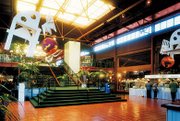Proposed Development to Displace FMSF
The design and gift trade show operator that owns the San Francisco Design Center and the Concourse Exhibition Center in San Francisco is planning a multimillion-dollar development project that will involve the relocation of the city’s premier trade shows.
Starting in the summer of 2006, Seattle-based Bay West plans to demolish the Concourse building, which provides space for corporate events and trade shows, and replace it with upscale apartments. Bay West is the parent company of the San Francisco Design Center, which is comprised of three venues in the metropolitan area: The Galleria, The Showplace and the Concourse.
The Concourse, a 125,000-square-foot contemporary glassand- steel pavilion with redwood construction, is located in San Francisco’s industrial South of Market area, a two-mile expanse that includes residential lofts, hip restaurants and nightclubs. Bay West owns 1 million square feet of property in the area, including the Concourse and the Gift Market Center across the street.
For more than three decades, the Concourse has served as an apparel, gift and furniture market center. The building was built in 1914 and underwent an extensive renovation in the mid-1970s.
Each year, the building hosts three trade shows: the San Francisco Furniture Market, the San Francisco International Gift Fair and the Fashion Market of San Francisco.
According to Margaret Casey, vice president of events and shows at the San Francisco Design Center, “We have enough business to relocate our trade shows to another venue if and when that happens.”
Bay West principals Bill Poland and Tim Treadway said the project will cost about $140 million. The development is expected to include up to 150,000 square feet of housing in two apartment buildings containing roughly 200 apartments each. Bay West has not yet secured building permits; it is currently working on a full environmental study, including an environmental impact report, which will be turned in sometime before the end of the year, Poland said. He added that he wants to see the area become a mixed-use neighborhood with a blend of commercial and residential space.
Poland said getting the project off the ground has not been easy because the city imposes strict development guidelines. The city enacted a moratorium against new development in the area south of Market Street after a large number of new businesses invaded the area in the late 1990s.
“It’s very hard to get approval in this town because it’s a highly fractious city government,” Poland said. “A proposal has been presented to the city’s planning commission, but I don’t know how long it will be before it is approved.”
Poland said the goal is to find a new venue for the trade shows. Currently, Pier 48, which has a 180,000-squarefoot warehouse space, is being considered as a possible location, he added.
Last year, the city spent $11 million on a seismic retrofit of the pier’s substructure to correct damage caused by a fire that nearly destroyed the building almost a decade ago. Renee Dunn, communications director at the Port of San Francisco, said about $1 million in repairs is still necessary before the building can be put to use.
Presently, the Port of San Francisco has not received a formal proposal from the trade show venue. However, the Port’s commission is currently looking for interim uses, or short-term leases, for the next three to five years while it seeks a permanent lessee. “We’re being approached by several different entities—from maritime to commercial businesses,” Dunn said.
San Francisco as a destination
In the meantime, the Golden Gate Apparel Association, a 40-year-old apparel group that holds trade shows five times a year, will remain at the Concourse, said Dianne Travalini, executive director.
The trade show—which caters mostly to department store and specialty store buyers from the Pacific Northwest—is now at full capacity with about 300 exhibitors, and there is a long waiting list, Travalini said. Exhibitors at the show include California apparel makers Babette, Byer California, Jessica McClintock, Koret of California and City Lights of San Francisco.
Apparel manufacturing in the area has dropped off in recent years, but there is still wholesale money to be made. The San Francisco market operates as a regional apparel market, and also as a destination for buyers.
“We’ve clearly marked our direct-mail marketing as ’San Francisco as a destination’—we try to sell the city as much as our show,” Travalini said.
Travalini said she is not too worried about having to relocate to another venue. “We have a very close and long-term relationship with the Design Center,” she said. “If and when they plan to go forward with their plan to move to another trade show venue, it will be developed in a way that will continue that relationship.”
Travalini and her associates at the Golden Gate Apparel Association have already set up a reserve account to cover unexpected costs. “We want to make the financial impact to our exhibitors as minor as we can,” she said.
Several apparel sources in the Bay Area said they are ready for a change.
“Dallas market has a new building, and Los Angeles has The New Mart,” said contemporary showroom owner Laurie Markman, who sells apparel lines by WestonWear, Equestrian Designs, Grassroots and Franca Pierpaoli at the Urban Style Showroomin the Gift Market Center. “So it would be nice to offer our existing buyers—many of whom have shown their lines at the Concourse for 20 years—some excitement and at the same time attract better contemporary buyers to the region with a venue that is a little bit more upscale.”






















